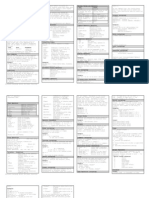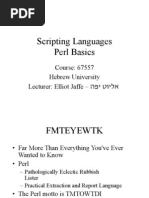Module 3: Variables, Data Types and Array
Uploaded by
madanModule 3: Variables, Data Types and Array
Uploaded by
madanModule 3: Variables, Data types and Array
Variables/Data types:
PowerShell assigns best fit primitive data type for a given value
The process of automatic selection of data type is called “Weekly typed”
Ex: $Course=‘PowerShell’, $Duration=2
Process of specifying the exact type of data to be stored is called “Strongly Typed”
Ex:[String]$Course=‘PowerShell’, [Int32]$Duration=2
<Variable_Name>.GetType().Name – Gives the actual data type of variable
Ex: [Byte]$Flag=12, $Flag.GetType().Name
Variable Type Description Example
[bool] Yes-no value [boolean]$flag = $true
[char] Individual unicode character [char]$a = "t"
Double-precision floating point
[double] $amount = 12.45
decimal
[int16] 16-bit integer with characters [int16]$value = 1000
[int32],
32-bit integers with characters [int32]$value = 5000
[int]
[int64],
64-bit integers with characters [int64]$value = 4GB
[long]
[single], Single-precision floating point
[single]$amount = 44.67
[float] number
[string] String [string]$text = "Hello"
[array] An array [array]$Students=("Peter","John","Ram","Rohan")
Working with Variables using cmd-let:
PS C:\Users\v-bapunn> New-Variable -Name a -Value "10"
PS C:\Users\v-bapunn> Get-Variable a
Name Value
---- -----
a 10
PS C:\Users\v-bapunn> Set-Variable -Name a 234
PS C:\Users\v-bapunn> Set-Variable -Name a -Value 234
PS C:\Users\v-bapunn> $a
234
PS C:\Users\v-bapunn> Get-Variable a
Name Value
---- -----
a 234
PS C:\Users\v-bapunn> Remove-Variable a
Apple Software Solutions Page 1
Protecting Variable:
Option Description
"None" NO option (default)
"ReadOnly” Variable contents may only be modified by means of the -force
parameter
"Constant" Variable contents can't be modified at all. This option must already
be specified when the variable is created. Once specified this option
cannot be changed.
"Private" The variable is visible only in a particular context (local variable).
"AllScope" The variable is automatically copied in a new variable scope.
Syntax: New-Variable –Name <Variable_Name> -Value <Variable_Value> -Option
<ReadOnly/Constant/Private/AllScope>
Environment Variables:
“Dir Env:” to view all available environment variables
$Env:Windir, $Env:ComputerName, $Env:UserDomain,Env:UserProfile
$Env:<Name>=<Value> - To Create new environment variable
[environment]::SetEnvironmentvariable("Path", $newValue, "User") to change environment
variable perminantly
Here Strings:
Here string always begins with @’ and ends with ‘@
Here string are useful when you required to provide single quotes and double quotes in
single string
Ex: $s= @'
"Hello world"
"One more line"
‘Get-Process’
Dir
'@
Apple Software Solutions Page 2
Escape Sequence:
Escape sequence is used to print newlines, tab space, alarm sound, etc..
Escape Sequence Special Characters
`n New line
`r Carriage return
`a Alarm
`b Backspace
`' Single quotation mark
`" Double quotation mark
`0 Null
Sub Expressions:
Variable contains an expression
$(Expression) is a variable
$(2+2) is variable with subexpression
“Result=(2+2)” displays “Result=(2+2)”
“Result=$(2+2)” displays “Result=4”
$File=dir d:\PowerShell, $file.Length
“The size of file is ($file.Length)” does not give expected size
“The size of file is $($file.Length)” gives expected size
Get-Member:
An objects properties and methods are referred as its members
Get-Member is the discovery cmdlet
– Alias: gm
Don’t assume that cmdlet output shows all or actual properties
– Some properties are calculated or custom
– PowerShell attempts to be IT Pro friendly
Pipe any command to Get-Member to learn about objects exiting the pipeline
Apple Software Solutions Page 3
Arrays:
• Array is a collection of objects
• PowerShell arrays supports to store multiple data type objects – objects do not have to be
same type
• PowerShell automatically wraps into an array, when there is more than one value/result
• Array elements can access with index number, Index starts from 0
• $RoleNo=100,102,104,106,108; $Servers=1..100 (“..” Range Operator)
• Polymorphic Array : $Student=100,”Suresh”,23,”Hyderabad”,[datetime]”June 10, 1985”
• Create empty array - $Employee=@(); Array only with 1 element - $NoOfStudents=,1
• $<Variable_Name>.Count – Gives number of elements in the array
• $Employee[0] gives first element of an array, $Employee[-1] gives the last element of an
array
• We can access multiple elements of an array; Ex: $List=Dir,$List[1,4,7,12]
• We can’t add/remove values from the default array.
• We need to create an array of type [syste.collections.arraylist] to do add/remove
operations
Apple Software Solutions Page 4
Hash Table:
Collection of Key/Value pairs
Do not require to use index to access array members unlike arrays
Can directly access members with “Key” name
Create hash table syntax : $Student=@{Key1=“Value1”;Key2=“Value2”}
Create new hash table : $list = @{Name = "PC01"; IP="10.10.10.10"; User="Tobias Weltner"}
$List.User,$List[“IP”],$List[“Name”,”IP”]
$Listy.Keys – lists all keys present in hash table
Ex: $test=@{Value1=12;Value2=1,2,3,4,5}
Insert New keys in existing hash table - $List[“Location”]=“Redmond”
Modifying value : $List[“Location”]=“Hyderabad”
Remove key from hash table : $List.Remove(“<Key_Name>”)
Help about_hash_tables
Ordered Hash:
Hash tables are unordered by default
No guarantee what order data will be displayed, Usually not an issue with small hash tables
PowerShell 3.0 introduced [ordered] attribute
$hash=[ordered]@{ A=123; B="foo"; C=3.14 }
Comparison Operators: Used to compare two values.
Operator Conventional Description Example Result
-eq, -ceq, -ieq = Equals 10 –eq 15 $false
-ne, -cne, -ine <> Not Equal 10 –ne 15 $true
greater than or
-ge, -cge, -ige >= equal to 10 -ge 15 $false
-lt, -clt, -ilt < less than or equal to 10 -le 15 $true
-le, -cle, -ile <= less than or equal to 10 -le 15 $true
-contains,
-ccontains,
-icontains contains 1,2,3 -contains 1 $true
-notcontains,
-cnotcontains,
-inotcontains does not contain 1,2,3 –notcontains 1 $false
Apple Software Solutions Page 5
Arithmetic Operator:
These operators used to perform Arithmetic Operators
Addition -> +
Subtraction -> -
Multiplication -> *
Division -> /
Modulus -> %
Logical Operator:
These operators used to compare two Relational operators.
AND -> -AND
OR -> -OR
XOR -> -XOR
NOT -> -NOT
Apple Software Solutions Page 6
You might also like
- Explain The Ideology of Pakistan in The Light of The Sayings of The Quaid100% (10)Explain The Ideology of Pakistan in The Light of The Sayings of The Quaid5 pages
- Windows Powershell 4.0 - Language Quick Reference PDFNo ratings yetWindows Powershell 4.0 - Language Quick Reference PDF4 pages
- Scripting Languages Advanced Perl: Course: 67557 Hebrew University Lecturer: Elliot Jaffe - הפי טוילא100% (1)Scripting Languages Advanced Perl: Course: 67557 Hebrew University Lecturer: Elliot Jaffe - הפי טוילא44 pages
- Exchange Management Shell Quick Reference Card: Foreach (Scripting)No ratings yetExchange Management Shell Quick Reference Card: Foreach (Scripting)3 pages
- Scripts and Command Line: Additional Shell Techniques, Tools, and Building BlocksNo ratings yetScripts and Command Line: Additional Shell Techniques, Tools, and Building Blocks47 pages
- Shooting The Trouble Down To The Wireshark Lua PluginNo ratings yetShooting The Trouble Down To The Wireshark Lua Plugin35 pages
- 17 Useful Functions For Manipulating Arrays in PHP - TechRepublicNo ratings yet17 Useful Functions For Manipulating Arrays in PHP - TechRepublic5 pages
- Scripting Languages Perl Basics: Course: 67557 Hebrew University Lecturer: Elliot Jaffe - הפי טוילאNo ratings yetScripting Languages Perl Basics: Course: 67557 Hebrew University Lecturer: Elliot Jaffe - הפי טוילא48 pages
- Delhi University PHP Question Paper Solution0% (2)Delhi University PHP Question Paper Solution9 pages
- Module 6: Functions, Filters Modules and Snap inNo ratings yetModule 6: Functions, Filters Modules and Snap in3 pages
- Module 5: Looping and Logical Constructs: If..elseNo ratings yetModule 5: Looping and Logical Constructs: If..else4 pages
- Module 1 (Introduction To Powershell) : Us/download/details - Aspx?id 34595No ratings yetModule 1 (Introduction To Powershell) : Us/download/details - Aspx?id 345953 pages
- Work Maintenance Instructions (WMI) To Upgrade BRN, BFNSM22.9, BRN22.9 Wagons To BRNM1, BFNSM1, BRN22.9M1 WagonsNo ratings yetWork Maintenance Instructions (WMI) To Upgrade BRN, BFNSM22.9, BRN22.9 Wagons To BRNM1, BFNSM1, BRN22.9M1 Wagons101 pages
- MBA - Sem 4 - B2B Marketing - Course SyllabusNo ratings yetMBA - Sem 4 - B2B Marketing - Course Syllabus4 pages
- Inter Audit MCQ and Case Studies - For Nov. 2023 ExamsNo ratings yetInter Audit MCQ and Case Studies - For Nov. 2023 Exams106 pages
- Blessed Are Those Who Die in The Lord Bob JenningsNo ratings yetBlessed Are Those Who Die in The Lord Bob Jennings10 pages
- Analysis and Solutions To Unusual Differential Relay MisoperationNo ratings yetAnalysis and Solutions To Unusual Differential Relay Misoperation9 pages
- Pitfalls of Punishment-13853979573262581144No ratings yetPitfalls of Punishment-138539795732625811447 pages
- IBM Spectrum Virtualize - BP Zoning 101-Top 10-Part1 HollywoodNo ratings yetIBM Spectrum Virtualize - BP Zoning 101-Top 10-Part1 Hollywood38 pages
- Analysis of Vehicle Exhaust Waste Heat Recovery Potential Using A Rankine CycleNo ratings yetAnalysis of Vehicle Exhaust Waste Heat Recovery Potential Using A Rankine Cycle56 pages
- Functional Progressions and Functional Testing in Rehabilitation100% (1)Functional Progressions and Functional Testing in Rehabilitation31 pages
- A Web-Based Lost and Found System For Gardner College DilimanNo ratings yetA Web-Based Lost and Found System For Gardner College Diliman3 pages
- Deploys and Tests A Workflow in CollibraNo ratings yetDeploys and Tests A Workflow in Collibra9 pages
- Explain The Ideology of Pakistan in The Light of The Sayings of The QuaidExplain The Ideology of Pakistan in The Light of The Sayings of The Quaid
- Windows Powershell 4.0 - Language Quick Reference PDFWindows Powershell 4.0 - Language Quick Reference PDF
- Scripting Languages Advanced Perl: Course: 67557 Hebrew University Lecturer: Elliot Jaffe - הפי טוילאScripting Languages Advanced Perl: Course: 67557 Hebrew University Lecturer: Elliot Jaffe - הפי טוילא
- Exchange Management Shell Quick Reference Card: Foreach (Scripting)Exchange Management Shell Quick Reference Card: Foreach (Scripting)
- Scripts and Command Line: Additional Shell Techniques, Tools, and Building BlocksScripts and Command Line: Additional Shell Techniques, Tools, and Building Blocks
- Shooting The Trouble Down To The Wireshark Lua PluginShooting The Trouble Down To The Wireshark Lua Plugin
- 17 Useful Functions For Manipulating Arrays in PHP - TechRepublic17 Useful Functions For Manipulating Arrays in PHP - TechRepublic
- Scripting Languages Perl Basics: Course: 67557 Hebrew University Lecturer: Elliot Jaffe - הפי טוילאScripting Languages Perl Basics: Course: 67557 Hebrew University Lecturer: Elliot Jaffe - הפי טוילא
- Module 5: Looping and Logical Constructs: If..elseModule 5: Looping and Logical Constructs: If..else
- Module 1 (Introduction To Powershell) : Us/download/details - Aspx?id 34595Module 1 (Introduction To Powershell) : Us/download/details - Aspx?id 34595
- Work Maintenance Instructions (WMI) To Upgrade BRN, BFNSM22.9, BRN22.9 Wagons To BRNM1, BFNSM1, BRN22.9M1 WagonsWork Maintenance Instructions (WMI) To Upgrade BRN, BFNSM22.9, BRN22.9 Wagons To BRNM1, BFNSM1, BRN22.9M1 Wagons
- Inter Audit MCQ and Case Studies - For Nov. 2023 ExamsInter Audit MCQ and Case Studies - For Nov. 2023 Exams
- Blessed Are Those Who Die in The Lord Bob JenningsBlessed Are Those Who Die in The Lord Bob Jennings
- Analysis and Solutions To Unusual Differential Relay MisoperationAnalysis and Solutions To Unusual Differential Relay Misoperation
- IBM Spectrum Virtualize - BP Zoning 101-Top 10-Part1 HollywoodIBM Spectrum Virtualize - BP Zoning 101-Top 10-Part1 Hollywood
- Analysis of Vehicle Exhaust Waste Heat Recovery Potential Using A Rankine CycleAnalysis of Vehicle Exhaust Waste Heat Recovery Potential Using A Rankine Cycle
- Functional Progressions and Functional Testing in RehabilitationFunctional Progressions and Functional Testing in Rehabilitation
- A Web-Based Lost and Found System For Gardner College DilimanA Web-Based Lost and Found System For Gardner College Diliman






























































































